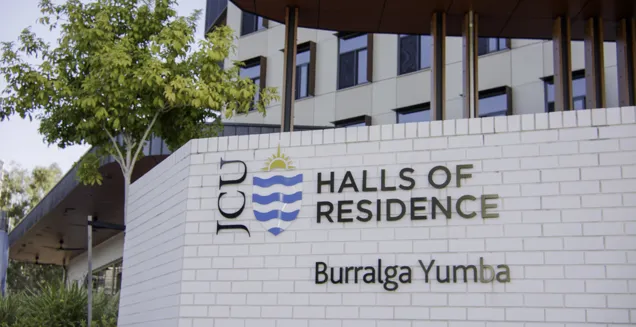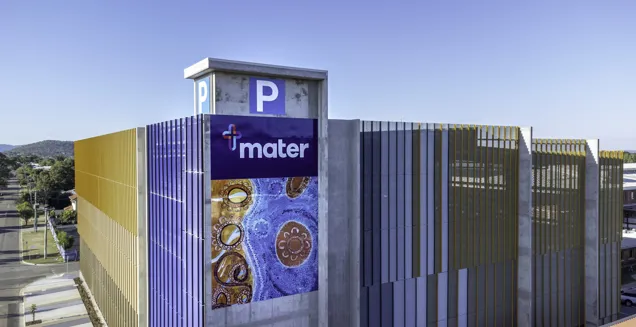Engineering & Innovation Place
James Cook University is being transformed with over $140 million in NAIF funding for the Engineering & Innovation Place and Student Halls of Residence projects.
June 2018
Social Infrastructure
Townsville, QLD

The JCU Engineering & Innovation Place (formerly called Technology Innovation Centre) is located in the city of Townsville, Queensland. On 15 June 2018, NAIF approved funding of up to $96 million for the Engineering & Innovation Place, where undergraduate and postgraduate engineering and IT students, industry partners and researchers are able to collaborate.
About James Cook University
James Cook University (JCU) is one of northern Australia’s key tertiary institutions. With campuses in Townsville and Cairns and study centres across the region, it educates more than 21,000 students across a broad range of disciplines.
The university also contributes to the regional economy through its workforce, research programs and capital projects, which have totalled more than $500 million over the past decade. A high proportion of graduates choose to remain in northern Queensland, supporting local industries and services. JCU’s mix of education, research and community presence makes it a key aspect of the region’s economic and social development.
Project Overview
NAIF has provided nearly $150 million in funding, through two Investment Decisions, to support James Cook University in Townsville.
The first financed the Engineering & Innovation Place as part of JCU’s long-term strategy to modernise the Townsville campus and accelerate the JCU Enterprise Bundle (the Engineering & Innovation Place, Townsville Campus Renewal and Townsville Central Plaza).
The Engineering & Innovation Place is the centrepiece of an innovation hub in which undergraduate and postgraduate engineering and IT students, industry partners and researchers converge and collaborate.
The complex is adjacent to the new Student Halls of Residence (Burralga Yumba) accommodation, which was also supported by NAIF through a separate Investment Decision for a loan of up to $46 million.
How We Helped
NAIF’s flexible financing was instrumental in bringing this project to financial close. By addressing funding gaps and offering tailored support, we enabled the project to progress at a time when traditional lenders were unable to meet the required risk profile.
As a government special investment vehicle, we provided concessional finance with longer loan tenors and more flexible terms than were available in the market. This gave James Cook University the certainty to proceed with Burralga Yumba while ensuring accommodation remained affordable for students.
Our role extended beyond funding. We helped de-risk the project, activated investment by providing early support and the confidence to proceed, and contributed expertise and guidance to shape the project’s financial structure and delivery.
Public Benefit
James Cook University is expected to draw more regional and international engineering students to the area on completion of this project.
Independent analysis at the time of the Investment Decision projected that the Engineering & Innovation Place project is forecast to create 270 jobs, with at least 80% of subcontractors and suppliers expected to be sourced locally.
NAIF’s Investment Decision gave JCU the confidence to progress the work required. The Technology Innovation Complex (Engineering & Innovation Place) will deliver leading-edge STEM (Science, Technology, Engineering and Mathematics) innovation, research and educational facilities for northern Queensland.
The TIC (Engineering & Innovation Place), and other projects planned and underway, will transform our Townsville campus and provide new and exciting opportunities for our region,
Professor Sandra Harding
Former JCU Vice Chancellor
Related Links
Indigenous Engagement
- The Bindal people
Townsville is located on the traditional lands of the Bindal and Wulgurukaba peoples. The James Cook University (JCU) Townsville campus, known as Bebegu Yumba, is situated on Bindal Country in the suburb of Douglas. This campus not only serves as a place of learning but also honours the cultural heritage and custodianship of the Bindal people. Bindal Country, known as Thul Garrie Waja, extends south of the Ross River and includes significant parts of Townsville and its surrounds. The Bindal people’s totem is the Eel (Burdell), symbolising their strong connection to water sources such as rivers, wetlands, estuaries, and coastal ecosystems, which are rich in biodiversity and cultural significance. A central element of their cultural knowledge is the shooting star, which is believed to signify either danger or a call for help from the direction in which it falls. Today, the Bindal people continue to uphold their responsibilities as custodians of both land and sea Country, preserving their cultural traditions and protecting the natural environment for future generations.
Indigenous Engagements Strategy Commitments
- Aims to achieve 3% Indigenous employment across the design, construction, and operational phases, with contractors required to promote Indigenous traineeship and cadetship opportunities where appropriate.
- Contractors must provide on-the-job training, inductions, mentoring, and upskilling for First Nations employees, and report regularly on employment outcomes, training delivered, and any challenges affecting target achievement.
- Tenderers must demonstrate previous experience employing First Nations peoples, either directly or via subcontractors. A 10% weighting will apply at the EOI stage and 5% at the RFT stage for Indigenous business engagement and employment strategies.
- Construction contracts will include provisions for tracking compliance with Indigenous Employment Strategy (IES) targets. Contractors must submit regular progress reports covering employment data for all contractors, training activities, and any barriers to target delivery.
- In collaboration with the Industry Capability Network (ICN), will host “meet the bidder” and “meet the buyer” forums to promote local and Indigenous business participation. The IES will be reviewed annually with contractors and relevant government stakeholders to refine and strengthen outcomes.
Indigenous Engagements Strategy Outcomes
- In 2021, contractor BESIX Watpac reported 19% First Nations employment, including a number of apprentices and a school-based trainee from Cowboys House. Cultural awareness training was delivered by Bindal Traditional Owners, who also participated in site ceremonies and held permanent representation on the project’s Indigenous Employment and Training Steering Committee.
- In 2022, First Nations employment reached 11%. BESIX Watpac broke down work packages to encourage participation from smaller Indigenous suppliers and collaborated with the National Indigenous Australians Agency, Queensland Government, and Townsville City Council to identify further opportunities.
- In 2023, BESIX Watpac achieved 10.2% First Nations employment, and Indigenous procurement exceeded $700,000, representing 1.15% of total spend. The period also saw the installation of Two Brothers, a public artwork by Waanyi artist Judy Watson, symbolising the Bindal story of Mount Stuart (Mandilgun) and Magnetic Island (Yunbenun).
- In 2024, JCU reported 12.1% First Nations employment at construction completion, with 3.2% First Nations employment achieved into the operational phase. Total procurement with First Nations businesses exceeded $705,000 during the construction period.


